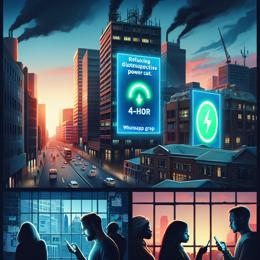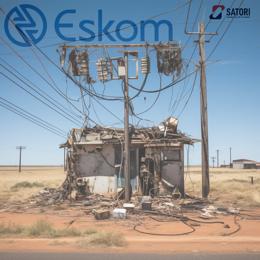Image created by AI
City Power Cracks Down on Unpaid Electricity Bills in Johannesburg
In Johannesburg, the struggle between consumers and the electricity supplier has reached a critical junction as City Power embarked on a stringent operation to disconnect services at several buildings, predominantly in the Hursthill area, due to a staggering R52 million in accumulated unpaid electricity bills. This harsh move left numerous residents without power and signaled an escalation in City Power's ongoing efforts to recover outstanding electricity debts.
The atmosphere in Milpark Mews apartment block, home to a diverse community including students, was particularly somber. The building, confronted with a R3.5 million deficit in payments, suffered a level two disconnection, which goes beyond a mere power disruption. This stringent measure involves physically removing the circuit breaker from the meter box, rendering the restoration of electricity services not just challenging but also indicative of a severe reprimand to prompt immediate action on outstanding payments.
According to Nokuthula Nxumalo, Hursthill manager for City Power, the buildings in question have accrued these substantial debts as payments made often fall short of the actual monthly billing, creating a deficit that balloons over time. Nxumalo elucidates that partial payments, while acknowledging the bills, do not ease the financial strain on the utility provider. The inability to collect full payments impairs City Power's operational capacity, further exacerbated by rampant infrastructure theft and vandalism, which are already plaguing the city.
City Power's revenue collection drive is part of an aggressive strategy to address the billions of rands owed in electricity debt across Johannesburg. The utility's stance reflects the tension between maintaining a stable power supply against the backdrop of financial sustainability and infrastructure integrity. Despite the disconnection strategy being a last resort, it serves as a harsh reminder of the need for consumers to settle their bills in full, lest they face the severe outcomes of systematic power supply terminations, which affects daily living and has broader economic repercussions.
In the wake of these power disconnections, discussions among residents and stakeholders have undoubtedly intensified, as they seek swift resolutions to restore power and ensure such disruptions do not become recurrent. The situation prompts broader contemplation on financial management, infrastructure security, and the urgent need for constructive dialogues between City Power and the communities it serves, to pave a pathway towards sustainable solutions.
The disconnection of power supply is not only a momentary inconvenience; it has far-reaching consequences on social dynamics and economic activities, especially for residents who rely on electricity for their daily needs and students whose academic progress hinges on consistent access to power for studying and research activities—making the resolution of such issues not just a matter of comfort but of crucial community progression.
The engagement between the impacted residents, affected students, property managers, and City Power itself now enters a pivotal stage as each party grapples with the implications of the disconnections and the pursuit of a mutually beneficial outcome. The path to re-establishing a reliable power supply lies in the hands of those indebted, with City Power standing ready to reconnect once outstanding financial obligations are fulfilled.









